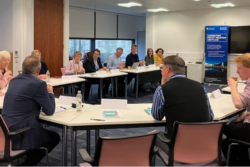The WMREDI Story was launched on Thursday, 10 October, at The Exchange, University of Birmingham. The report provides an in-depth look at the West Midlands Regional Economic Development Institute’s (WMREDI) successes, challenges, achievements, and impact. Find out more and download the WMREDI Story A brief history of WMREDI WMREDI was based at the University of … Continue reading “The Launch of the WMREDI Story”
Academic-Policy Engagement: A Model for Delivering Place-Based Missions?
On 23 September, the Heseltine Institute, City-REDI (City-Region Economic Development Institute), and the Yorkshire and Humber Policy Engagement and Research Network (Y-PERN) hosted a roundtable fringe event at the Labour Party conference in Liverpool to explore how universities can contribute to place growth. This blog was first posted on the Heseltine Institute blog site, by … Continue reading “Academic-Policy Engagement: A Model for Delivering Place-Based Missions?”
Expert Insight: Developing Skills for Innovation and Business Growth in the West Midlands
Anne Green, Professor of Regional Economic Development and Co-Director of City-REDI, University of Birmingham, is a commissioner for the Business Commission West Midlands. She has been supporting engagement in the region’s business community and the creation of the final ‘Roadmap for Business Growth’ report. In this blog, Anne reflects on her role in the commission … Continue reading “Expert Insight: Developing Skills for Innovation and Business Growth in the West Midlands”
West Midlands Economic Impact Monitor – 26 September 2024
This week has seen the first Labour Party Conference since the General Election in July 2024. Looking ahead to the Chancellor’s first budget in October, Rachel Reeves announced there would be no increase in income tax, national insurance or VAT, refusing to return to austerity. There was an announcement of the return of industrial strategy. … Continue reading “West Midlands Economic Impact Monitor – 26 September 2024”
Rail Nationalisation – Real Policy Change or Just Ideology?
The UK Labour Government’s plan to renationalise train operating companies aims to gradually transition them to state control as contracts expire, but this move is more a continuation of existing trends than a radical shift. Professor Donald Houston, Dr Magda Cepeda-Zorrilla and Dr Sara Hassan look at the core challenges facing British railways. The UK … Continue reading “Rail Nationalisation – Real Policy Change or Just Ideology?”
Project Spotlight: Socio-Economic Impact Model for the UK (SEIM-UK)
In a new series of blogs, we will be reviewing the current and historical work of City-REDI and WMREDI. In the first blog from this series, we look at SEIM-UK, an economic model that City-REDI has used to assess the economic impact of the 2022 Commonwealth Games, the impact of Council tax cuts, and help … Continue reading “Project Spotlight: Socio-Economic Impact Model for the UK (SEIM-UK)”
Rethinking Regional Policy: Embracing the Capability Approach (Key Learnings From Maria Abreu’s Seminar)
In the realm of regional policy, there exists a conventional approach which focuses on resources and life satisfaction. However, a more inclusive and pluralistic perspective, known as the capability approach, has gained popularity. Though commonly implemented in small-scale projects, it has the potential to revolutionize regional policy. In this blog, Sara Hassan writes about Maria’s … Continue reading “Rethinking Regional Policy: Embracing the Capability Approach (Key Learnings From Maria Abreu’s Seminar)”
Passion and Precarity: How Creative Industries Leverage Motivation
James Davies discusses his latest paper co-authored with Jon Morris and Gazi Islam. The paper examines the working lives of freelance television workers and the attraction of ‘meaningful work’ to increasingly precarious work conditions. View the paper – Morris, Islam and Davies (2024) The search for meaningful work under neo-bureaucracy: Work precarity in freelance TV. … Continue reading “Passion and Precarity: How Creative Industries Leverage Motivation”
Tax Rises Less Regressive Than Spending Cuts – How Does the Council Financial Crisis Impact Households?
There is increasing concern about the financial viability of some local authorities with estimates by the LGA suggesting that councils in England are facing a funding gap of £4 billion. In 2023 Birmingham City Council (BCC) was served a section 114 notice. This means that effectively the council ran out of money. In short, BCC … Continue reading “Tax Rises Less Regressive Than Spending Cuts – How Does the Council Financial Crisis Impact Households?”
Improving Public Funding Allocations to Reduce Geographical Inequalities
This blog shares details of a new project called ‘Improving public funding allocations to reduce geographical inequalities’, involving an inter-disciplinary multi-institution team led by Charlotte Hoole (Principal Investigator), Anne Green, Sheela Agarwal, Sarah Ayres, Jon Burchell, Ceri Davies, Jonathan Davies, Mike Emmerich, Daniel Mutibwa and Andy Pike, with James Gilmour, Abigail Taylor and Sanne Velthuis. … Continue reading “Improving Public Funding Allocations to Reduce Geographical Inequalities”











